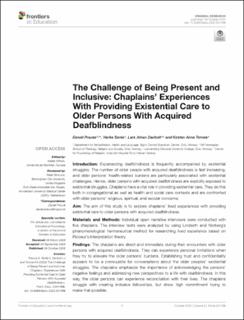| dc.contributor.author | Prause, Daniel | |
| dc.contributor.author | Sørlie, Venke | |
| dc.contributor.author | Danbolt, Lars Johan | |
| dc.contributor.author | Tornøe, Kirsten | |
| dc.date.accessioned | 2022-10-19T12:52:24Z | |
| dc.date.available | 2022-10-19T12:52:24Z | |
| dc.date.created | 2020-10-28T13:53:21Z | |
| dc.date.issued | 2020 | |
| dc.identifier.citation | Frontiers in Education. 2020, 5 1-11. | en_US |
| dc.identifier.issn | 2504-284X | |
| dc.identifier.uri | https://hdl.handle.net/11250/3027110 | |
| dc.description.abstract | Introduction: Experiencing deafblindness is frequently accompanied by existential struggles. The number of older people with acquired deafblindness is fast increasing, and older persons’ health-related burdens are particularly associated with existential challenges. Hence, older persons with acquired deafblindness are explicitly exposed to existential struggles. Chaplains have a vital role in providing existential care. They do this both in congregational as well as health and social care contexts and are confronted with older persons’ religious, spiritual, and secular concerns. Aim: The aim of this study is to explore chaplains’ lived experiences with providing existential care to older persons with acquired deafblindness. Materials and Methods: Individual open narrative interviews were conducted with five chaplains. The interview texts were analyzed by using Lindseth and Norberg’s phenomenological hermeneutical method for researching lived experience based on Ricoeur’s interpretation theory. Findings: The chaplains are direct and immediate during their encounters with older persons with acquired deafblindness. They can experience personal limitations when they try to alleviate the older persons’ burdens. Establishing trust and confidentiality appears to be a prerequisite for conversations about the older peoples’ existential struggles. The chaplains emphasize the importance of acknowledging the persons’ negative feelings and addressing new perspectives to a life with deafblindness. In this way, the older persons can experience reconciliation with their lives. The chaplains struggle with creating inclusive fellowships, but show high commitment trying to make that possible. Conclusion and Implications for Health and Social Care: Chaplains can contribute to the existential well-being of older persons with acquired deafblindness through their presence in times of existential struggle. They provide existential care in a highly compassionate way, but can also experience the support they offer as insufficient. The implementation of a systematically organized service for existential care to older persons with acquired deafblindness could be worthwhile. Discourse about different ways of using (sign) language and other possibilities for the inclusion of older persons with acquired deafblindness in the Deaf Church and other communities is recommended. | en_US |
| dc.language.iso | eng | en_US |
| dc.relation.uri | https://www.frontiersin.org/articles/10.3389/feduc.2020.541498/full | |
| dc.rights | Navngivelse 4.0 Internasjonal | * |
| dc.rights.uri | http://creativecommons.org/licenses/by/4.0/deed.no | * |
| dc.title | The challenge of being present and inclusive : chaplains' experiences with providing existential care to older persons with acquired deafblindness | en_US |
| dc.title.alternative | The challenge of being present and inclusive : chaplains' experiences with providing existential care to older persons with acquired deafblindness | en_US |
| dc.type | Peer reviewed | en_US |
| dc.type | Journal article | en_US |
| dc.description.version | publishedVersion | en_US |
| dc.source.pagenumber | 1-11 | en_US |
| dc.source.volume | 5 | en_US |
| dc.source.journal | Frontiers in Education | en_US |
| dc.identifier.doi | 10.3389/feduc.2020.541498 | |
| dc.identifier.cristin | 1842963 | |
| cristin.ispublished | true | |
| cristin.fulltext | original | |
| cristin.qualitycode | 1 | |

